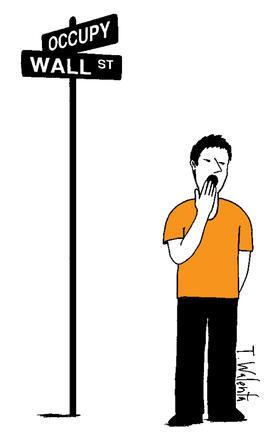For most, business as usual despite Wall Street protests

Old Nassau is no Zuccotti Park. As activists stormed the streets of Lower Manhattan and many other locations to protest corporate greed and economic inequality, University seniors continued to rush to information sessions with investment banks and consulting firms.
That the timing of Occupy Wall Street aligned with job-recruitment season in the financial-services sector highlighted the reality that the Ivy-League-to-Wall-Street pipeline was alive and well at Princeton despite the political upheaval taking place just a train ride away.
Some students, speaking shortly before police evicted the New York protesters Nov. 15, said they felt that the protesters were not credible enough to be taken seriously. Travis Boyce ’12 said that he would view the demonstrators as simply a “sideshow or circus act” until they put forth a more coherent argument and examples of the changes they want to see in the financial industry.
Boyce, who has secured a position in finance after graduation, has no qualms about breaking into Wall Street himself. “I don’t see myself as embarrassed, and don’t think people are any different in terms of the reaction to saying you work on Wall Street,” he said.
At the University’s Office of Career Services, director Beverly Hamilton-Chandler said there has been no change in the number of students applying for campus interviews with finance and consulting firms during the fall semester. Financial services has been one of the most popular employment options for Princeton seniors in recent years, selected by 10 to 12 percent of members of the classes of 2009 and 2010 who reported having jobs before graduation.
That is unlikely to change soon, many said. “I think Princeton students are a little too driven in whatever direction they’re going into to let a little something like a protest movement change their career paths,” said Wilson School concentrator Jacob Reses ’13. He said he does not support the movement because its message is inconsistent and “many of the protesters seem to think their political frustrations justify lawlessness.”
Other factors contribute to the lack of buzz on campus about Occupy Wall Street, Reses said. “I don’t think it really resonates here,” he said. “This is a campus that is far less political than a lot of people might expect — so while I think people are conscious of Occupy Wall Street, like most political issues it’s not something that’s really on their minds.”
This is not to say that there have been no efforts among students to support and learn about the movement. On Nov. 17, about 50 students gathered outside Frist Campus Center to show solidarity with the Occupy protesters and discuss topics ranging from poverty to inequality. Earlier, small groups of students traveled into New York City to witness the movement firsthand and attended “teach-ins” to discuss their experiences at the demonstrations.
But considered alongside students at some peer institutions, Princeton’s engagement with the movement looked somewhat tame. Harvard and Yale students protested on their respective campuses through groups such as Occupy Harvard and Occupy New Haven. In early November, nearly 70 Harvard students walked out of their introductory economics class — taught by Gregory Mankiw ’80 — to demonstrate their “discontent with the bias inherent in this introductory economics course” as well as their support for the Occupy Wall Street movement.
Some blamed the comparative lack of action at Princeton on students’ being overscheduled. “We don’t really have time to read up about this protest going on and go to New York,” Alexandra Jerez-Fernandez ’12 said. “That comes second. Work comes first.”
But Wilson School professor Stanley Katz disagreed. “I don’t think that’s true at all — you’ve got time to eat, you’ve got time to think about these things,” he said.
“It’s not thought to be civil on this campus to be too outspoken,” Katz said. “On one level that’s admirable, and it’s keeping the tone around here very nonconfrontational, but intellectually it’s a disaster.”
Ben Cogan ’12 echoed Katz’s sentiments, noting that protesting is not the typical avenue through which Princeton students participate in the community. “They think it’s more effective if you engage people who are actually effecting change, rather than taking to the street,” he said.
But whatever their views on the movement, a keen interest in finance will keep Princeton students on Wall Street, said economics professor Elizabeth Bogan.
“Finance is the blood of any country,” she said. “The reason the students want to go into finance is not just the income — it is high income, but it’s also where resources get allocated. So our students are interested in being part of that very important allocation. It’s no different from someone wanting to be a doctor because they find healing people to be fascinating.”












5 Responses
Russ Stratton ’60
10 Years AgoThe University and Wall Street
Completing both a call to my broker and my third Chivas, I began to consider PAW’s piece, “For most, business as usual despite Wall Street protests” (On the Campus, Dec. 14). Although the drink was excellent, I had forgotten to remove the silver spoon and almost choked on it; however, Soames, my butler, saved the day.
Good old Soames! I make it a practice never to encourage intimacy in servants, but unbidden, he advised me not to fret about those dirty hippies with their generalized complaints. “It’s simply a circus,” he whined, and I felt much better, especially since my grandson, Parvenu III, who doesn’t need to work at all, recently secured a posh position (without pressure, I promise!) via the Ivy-to-Wall-Street pipeline, which isn’t oily at all.
“Don’t let a little something like a protest movement upset you, Master,” Soames purred. “After all, you’re due at the club soon. Remember that weekly dinner for 60 you’re hosting. You haven’t much time to taste the ’45 Mouton, you know.”
That really got me thinking. Should I introduce discussions of poverty and inequality at my dinner? We all, of course, need a little levity in these trying times. But speaking of time, I don’t have enough of it to bother with quaint protests by lawless demonstrators, especially if they didn’t go to good schools. It’s enough to make me wash my hands, one washing the other, as we often amusingly remark.
Taking to the street indeed! How déclassé! Sliding into the Bentley, I poured another drink and sensed how like a surgeon I am, healing fellow club members via commodity allocation, especially when my Comet cognac gets passed around.
Ken Scudder ’63
10 Years AgoThe University and Wall Street
PAW’s Dec. 14 On the Campus column was dismaying enough. How best to respond? Occupy Princeton did it best, delightfully deconstructing Wall Street’s crimes in its YouTube video. To Occupy’s eloquent statement, I’d add the subheads in investment adviser Leland H. Faust’s op-ed, “Wall Street is a raw deal for the 100 percent” (San Francisco Chronicle, Dec. 29).
They are: the cult of a Wall Street superstar, gambling disguised as investing, the bail-me-out syndrome, enormous conflicts of interest, leverage on a grand scale, failure of regulators and the reform law, misappropriation of client funds, worthless rating agencies, golden parachutes soaring high, and breakdown of morality.
Perhaps, before graduating, Princeton seniors should take a cautionary refresher course in ethics, to be taught by professors Peter Singer, Cornel West *80, and Robert George.
Richard M. Waugaman’70, M.D.
10 Years AgoThe University and Wall Street
What a relief to read the comments by Professor Stanley Katz in the Dec. 14 On The Campus column! However, the same column left one with the unsettling impression that Princeton exists to serve and to perpetuate the 1 percent, and that current undergraduates have no problem with the shamefully worsening wealth gap in the United States. It was déja vu for me when I read that Princeton is a “far less political” campus these days. When President Robert Goheen ’40 *48 addressed the incoming freshmen in 1966, he told us we would be too busy with our studies at Princeton to get involved yet in the wider world. That’s not how things worked out.
The previous tradition of apathy at Princeton gave way to intense political involvement in protesting the Vietnam War, Princeton’s investments in apartheid South Africa, etc. Yes, there’s no doubt that facing the draft awakened some of us from our apathetic slumbers. Still, I don’t agree with Vladimir Teichberg ’96 (A Moment With, Dec. 14) that “all of our institutions have become completely corrupt.” Not Princeton!
Aaron Harnly ’99, Aaron Michels ’00
10 Years AgoThe University and Wall Street
When we were at Princeton, we often were reminded that Princeton’s motto is “In the nation’s service and in the service of all nations.” Despite this ideal, we realize that to many within and outside the Orange Bubble, Princeton symbolizes something much less noble: greed, privilege, and elitism. We believe that part of this perception stems from Princeton’s strong institutional support for financial-service firms that have manipulated the political systems and economies of nations around the world to the detriment of those societies and the stability of the global financial system.
We applaud the students of Occupy Princeton for challenging Princeton’s dominant culture of political disengagement. Princeton graduates have the opportunity to choose their own career paths. If they do choose to work in finance, they should know they are entering an industry with a reprehensible historical record of breaching public trust and engaging in practices that run directly counter to Princeton’s motto. We believe that the Occupy Princeton protests send an important message to these financial institutions about the University’s values and serve to educate students considering a career in finance.
The University administration should support those students who are attempting to bring Princeton into a much-needed national conversation about income inequality and economic injustice. Moreover, we urge the administration to stop providing institutional support for recruiting on campus by the worst offenders of the financial industry. Instead, Princeton should redirect its resources to support career options that look beyond the pursuit of profit and allow the University and University graduates to show true leadership and social responsibility, whether in finance or in any other field.
Lastly, we call on fellow alumni to join us in making it clear that “In the nation’s service and in the service of all nations” must include everyone, not just the wealthiest 1 percent.
Rocky Semmes ’79
10 Years AgoThe University and Wall Street
There is something disconcertingly disingenuous in economics professor Elizabeth Bogan rationalizing the desire to participate in “allocation of resources” as a major reason that financial services are among the most popular of employment options for Princeton seniors, while in the same breath — almost parenthetically — she notes that “it is high income.” It is her choice of euphemism in using “allocation of resources” instead of “controlling the money” that suggests some suspect level of insincerity. It brings to mind other unrelated but euphemistically deceptive covert cloaks, such as “collateral damage” and “reduction in force.” What is there to hide?
This engaging article by Tara Thean includes the observation that some investment-banking-bound seniors deemed Occupy Wall Street protesters as “not credible enough to be taken seriously.” Yet considering that it was those controlling the money who contributed to the tribulation trifecta of our real-estate bubble (the mortgage bankers), our painfully protracted wars (the defense industries), and our market debacle (the investment firms), these protests by no means are totally unfounded and completely without credibility. Something is clearly not right in the scheme of things in this, our great land, and there is nothing to lose and everything to gain through a thorough scrutiny of the instability of our system.